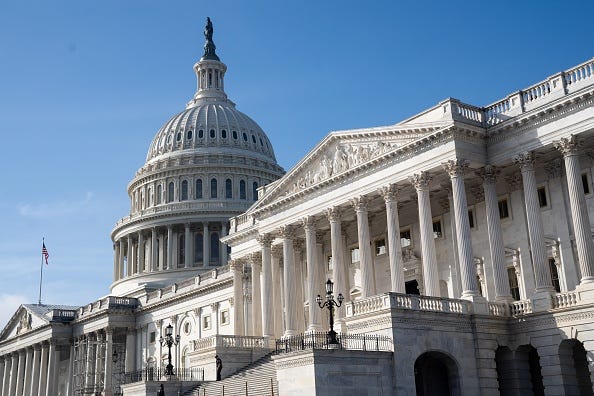Republican Congressional Takeover May Spur Biden's Regulators to Move Even Faster
Also, Republican CFTC Commissioner Holds Up Political-Betting Vote; New SEC Chief of Staff
The common wisdom holds that a Republican takeover of the House and Senate in this week’s election would spell almost certain doom for the Biden regulators – especially SEC Chair Gary Gensler whose 50 rule to-do-list has already inspired big pushback from GOP lawmakers. But, aside from calling agency heads to Capitol Hill for frequent testimony and demanding internal documents in oversight probes, is there really anything concrete that Republicans can do to slow the Democrat’s administrative state? The answer, we found after checking in with a number of lawyers, lobbyists, government staff members and others who pay close attention: not really. In fact, Republican victories may cause the pace of rulemakings to speed up. What follows are some observations we picked up in our reporting:
Top targets: Gensler, who has the most aggressive and controversial agenda (especially his proposed climate disclosure plan), is the most likely to face congressional pressure. Next up, people say, is CFPB Director Rohit Chopra, who many financial firms argue is pushing the legal limits in pressing regulations both at his agency and at the FDIC, where he has a board seat. Expect some attention also on Michael Barr, the Fed’s vice chair for supervision, who carries the biggest stick against Wall Street banks. His foray into the climate wars (setting up a pilot program for stress testing banks’ global warming risks), upset Republicans.
More testimony and congressional demands, people told us, can be disruptive. They take up staff time, and importantly distract the political leaders from carrying out their agendas. But Gensler, Chopra and Barr have all spent time in the hot seat – and are adept at dodging lawmakers’ hostile questions. Also, some pointed out to us that they may ultimately decide to blow off requests if they are too frequent or burdensome. As politics (and even regulation) has grown more nasty, the norms have changed. The executive branch and independent agencies are less likely to kowtow to demands from opposing party lawmakers.
Congress still closely divided: No matter what happens tomorrow in the midterms, Joe Biden is still president. That means he can veto any legislation that goes after his regulators – which could only be overturned by two-thirds majorities in both chambers of Congress. That’s a tall order, especially in the Senate where if Republicans do win, the margin is expected to be very thin. That, of course, also means that it will be hard to pass bills in general. Most need 60 votes in the Senate to clear procedural hurdles. Gridlock will benefit Gensler and the other regulators as they beaver away. Here’s a look at the two most discussed legislative options for handcuffing regulators:
Policy riders: The time-honored favorite move for banning a regulation is to add a provision to a must-pass bill like an agency’s funding legislation. For example, Congress has barred the SEC since 2015 from issuing rules that would require companies to disclose their political contributions. (And despite attempts by Democrats to strip it out, the measure has been approved every year since.)
Using these so-called riders is controversial since they are often directives that couldn’t get passed on their own – and are meant to be tucked into a voluminous piece of legislation where they are difficult to spot. Still, the outlook for success, people pointed out, may be dim. One big reason is that Congress has routinely been funding the government through continuing resolutions and it is much harder to stick these types of provisions on such bills.
Congressional Review Act: This 1996 law gives Congress 60 legislative days after a regulation is submitted to overturn it. The president also must agree – meaning, again, with Biden still in the White House this is not a tool that can be used to stop regulations, at least not right away.
In the longer term, however, it could be effective if a Republican wins the presidency in 2024 and Congress is also under GOP control. That could put rules that aren’t completed until near the end of the Biden era in jeopardy. And Republicans in recent years have shown great interest in using the review act. The law had been rather obscure until Donald Trump’s 2016 victory when Republicans nullified 16 Obama administration rules in the following Congress (it has only been used to kill one previously). However, when Biden won, Democrats struck down only three of Trump’s rules. That included one in the financial services area, the “true lender” regulation approved by Trump’s OCC. It was meant to remove legal risks that had discouraged banks from entering into lending relationships with fintechs and other third parties.
Sidney Shapiro, a law professor at Wake Forest, said that the looming deadline will likely serve to speed up the Biden regulators.
“If the agencies get their rules done as soon as possible, then they aren’t subject to CRA because of the deadlines,” he said. “So at a minimum, whatever agencies have in the hopper, they ought to get done.”
The big picture: A Republican sweep isn’t going to be a game-changer in halting aggressive regulators like Gensler. For companies that want to kill rules, filing lawsuits and winning in the courts probably remains the best tactic.
Advertisement:
Election Wager Delay: More than a week ago, the CFTC was supposed to issue a ruling on a controversial plan to let investors bet on politics. So after the derivatives regulator blew through its self-imposed Oct. 28 deadline, we wondered: what’s going on?
Well, it turns out the delay is at least partly due to Republican Commissioner Caroline Pham, who has gummed things up a bit by not yet weighing in on the proposal, which was submitted by trading platform Kalshi, according to people familiar with the matter. Under CFTC rules, a matter to be voted on is sent to one commissioner’s office, then to the next and so on. Pham has to vote, so the process is essentially stalled.
Kalshi’s application to list so-called event contracts based on the congressional elections has been among the most continuous policy debates on the CFTC’s plate for weeks. For her part, Pham is considered to be among the Kalshi’s staunchest supporters inside the agency, according to staff members. In public statements she has questioned whether the agency has appropriately handled the firm’s petition.
A CFTC spokesman and a representative for Pham declined to comment.
Last month, CFTC staff urged the agency’s five-member commission to deny Kalshi’s request. It’s widely assumed that Chairman Rostin Behnam and the two other Democrats will follow the recommendation in casting their votes. If the Republicans commissioners dissent, Kalshi would be rejected 3-to-2.
Pham has been abroad at conferences in Morocco and Singapore, prompting some inside the agency to wonder if her travel schedule has been a factor in why she hasn’t voted. (The commissioner has chronicled the visits on her Twitter feed – which some CFTC workers have been avidly viewing each day.) But a person familiar with the matter disputed that, saying Pham has been thoroughly studying the company’s proposal for weeks, including during her recent trips.
One solution to the hold-up is that Behnam could summon commissioners to a public meeting - and force a vote. And he could have a good reason: the CFTC faces a statutory deadline of Nov. 24 to decide on Kalshi’s application. (It’s worth pointing out that is Thanksgiving.) There are also procedural steps that the commission could take to extend that date further.
One thing that’s clear: if the CFTC does deny Kalshi’s proposal, the firm is all but guaranteed to sue. PredictIt, another market, has already filed a lawsuit against the CFTC after the agency demanded that the company shut down its political contracts by early next year.
Kalshi’s contracts would let a trader wager as much as $25,000 on whether Republicans or Democrats will take control of the House and Senate. The odds have always seemed low that the company would win approval, considering that the CFTC has long opposed betting on politics – and many think it is prohibited by federal law.
Thanks for reading us today. We’re always looking for stories, so if you have any suggestions on what we should cover (or comments about Capitol Account), shoot us a note. Jesse can be reached at: jwestbrook@capitolaccountdc.com and Rob at: rschmidt@capitolaccountdc.com. If somebody forwarded this to you and you’d like to subscribe, hit the button below. Please email for our government rate and group discounts for businesses: subscriptions@capitolaccountdc.com.
New Top SEC Aide: Amanda Fischer, currently a senior counselor to Gensler, will become chief staff of staff following the departure of Prashant Yerramalli at the end of the year, the SEC said today. Fischer joined the commission in June 2021 after Gensler took over. She previously worked on Capitol Hill as an aide to Rep. Katie Porter and on the Senate Banking Committee.





